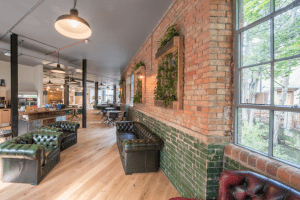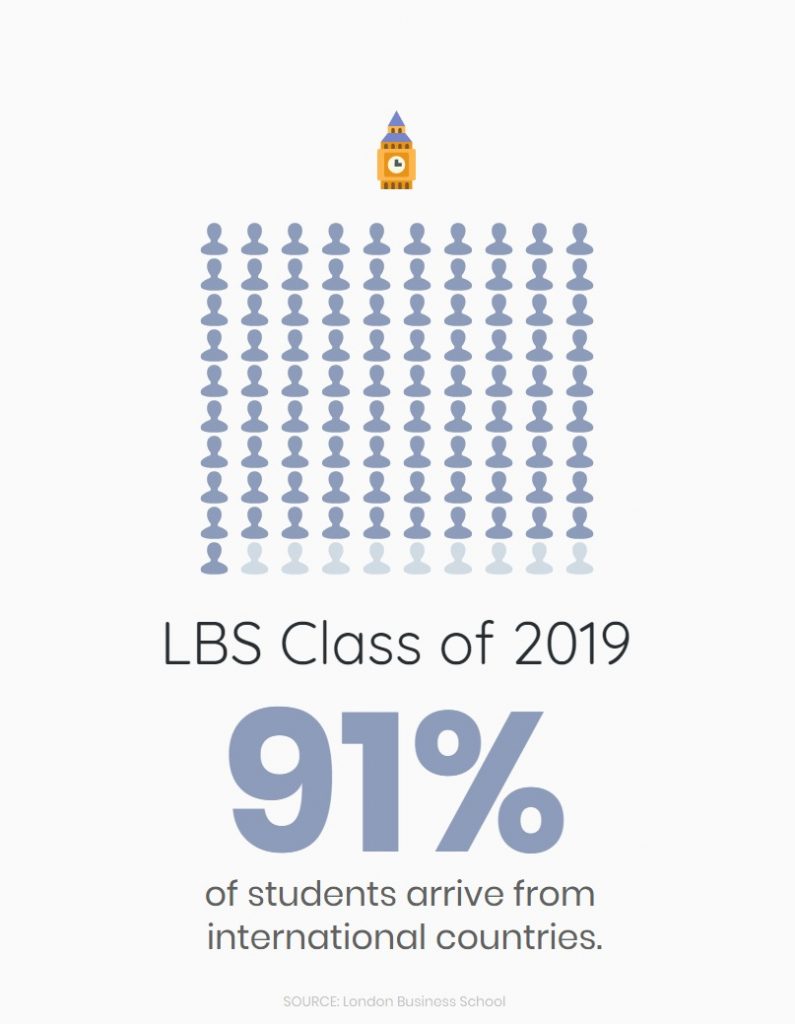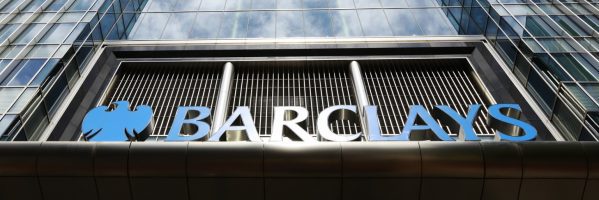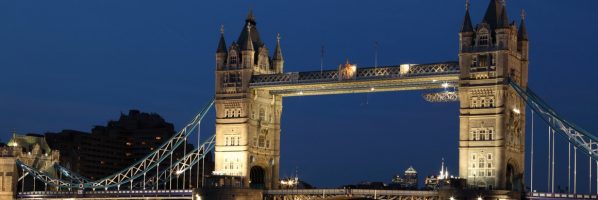Oxford Saïd Dean, Together with Apple’s Tim Cook, Launches New Entrepreneurial Hub

Building on the success of Saïd Business School’s Oxford Launchpad and Skoll Centre for Social Entrepreneurship, Oxford University has launched a new entrepreneurial hub: the Oxford Foundry. Saïd Dean Peter Tufano and Apple CEO Tim Cook helped kick things off at an October 11 launch event.
The new student-led and student-centric hub will be open to all 23,000 Oxford students and is part of an effort to inspire campus-wide innovation. Its focus will be to help students develop their entrepreneurial skills as well as create and scale ventures.
The Oxford Foundry will welcome students from all academic disciplines, from engineering and medicine to history and business. The goal is to take these students from all different backgrounds and bring them together to learn from one another, generate new ideas, and tackle business and societal issues.
In particular, the new hub will support students in the three following ways:
- Community Building: The Oxford Foundry will draw inspirational and leading figures in the entrepreneurial world to speak to students and exchange ideas. It will also have a student advisory board and will partner with societies across the university including the 10,000-strong Oxford Entrepreneurs.
- Experiential Learning: The Oxford Foundry will host problem-solving competitions and workshops to help students put various skills and ideas to work.
- Start-Up Support: Each year, a select number of ventures will receive support including dedicated workspace, access to networks, and industry expertise to scale and start their ventures.
Oxford has a strong history of entrepreneurship and has produced more founders of “unicorn” businesses (worth $1 billion or more) than any other school in Europe. The new Oxford Foundry promises to only further strengthen this entrepreneurial community.

A look inside the new Oxford Hub.
“Entrepreneurship is of increasing importance to students. As a generation, millennials desire to be more socially responsible, innovative and to make an impact,” Oxford Foundry Director Ana Bakshi said in a university press release. “Whether starting their own ventures or aspiring to lead in organizations, the Oxford Foundry will develop students’ entrepreneurial skills, understanding, and self-efficacy. The aim is to create future leaders whatever career they pursue.”
The Oxford Foundry spans two floors in a renovated Victorian ice factory. It offers co-working space, presentation areas, a café, and incubator space for accelerating new ventures.
To learn more about the Oxford Foundry, visit the school website.
This article has been edited and republished with permissions from Clear Admit.
London Business School Still Hotspot for International Students

London is a key destination for people abroad, especially for its business schools.
The London Business School is still attractive for international students, a press release reads. The incoming 2019 class will be 91 percent international—even with the drama and controversy following the Brexit decision. It seems that this move might actually be helping the school attract more students.
“Students coming here have seen increased purchasing power (due to the fall in the pound), while LBS has succeeded in hiring excellent faculty for the 2017–18 school year,” Professor of Management Practice in Accounting Andrew Likierman said.
The 2019 cohort is made up of 432 students with just 39 percent women. They come from 62 different countries and are around 29-years old. They’ll likely see the success. Ninety-four percent of last year’s students had found a job within three months of graduation. One of the students joining the school is 2019 is Sherry Stolar.
“I’ve lived in London twice before, and there’s no other place in the world with such diversity,” she said. “LBS’s class reflects that, with students from 70 countries and from diverse backgrounds.”
Stolar values having global peers. After all, the business world operates out of a global market. Meeting people from around different corners of the world certainly doesn’t hurt her—or any other student’s—chances at making it in business.

Forbes gave the business school the best international ranking, so it’s likely to keep seeing more students from outside the country. Its MBA programs include a full-time, executive, and several masters programs. For student Amanda Morgan, there’s nowhere else she’d rather be. The school’s international student body is what she wants to further her career.
“Diversity is important because a large part of what you learn on an MBA is from your peers,” Morgan said. “Students and faculty at LBS offer a vast range of perspectives from which I can learn and later apply in a consciously global context.”
Cambridge Judge Announces New Barclays Partnership Course

Meet the Barclays Scale Up UK Programme.
It’s a 36-week long course by the Judge Business School at the University of Cambridge in partnership with British multinational mega-bank Barclays.
The new course plans to help businesses address core growth problems, according to a recent press release. Professors Stelios Kavadias and Hanadi Jabado of the School’s Entrepreneurship Centre will lead the course—and they’ll get help from other industry experts, too. Both instructors carry impressive resumes: Kavadias is the Margaret Thatcher Professor of Enterprise Studies in Innovation & Growth, and Director of the school’s Entrepreneurship Centre. Jabado is Executive Director of the Entrepreneurship Centre.
“Small businesses face many hurdles in successfully scaling up, so Cambridge Judge Business School is offering companies the opportunity to upgrade their managerial skillsets to get access to capital and scale their organization up,” Cambridge Judge Dean Christoph Loch said in the press release. “The new Barclays Scale Up UK Programme will provide a clear framework for addressing these issues, and the business school is delighted to provide its expertise.”
Company founders and senior executive teams at the bank will now have access to essential lessons in tapping into growth that’ll only benefit the business. Barclays clients that still have room to grow can take the course. That means any business, from startups to those making more than £20 million in annual sales. The course will take in no more than 20 leadership teams.
The course is made up of several different major components including marketing, operational excellence, recruitment, and funding. These, among others, are essential to building growth in new businesses.
“From talking to our clients, we recognize there is a knowledge gap when it comes to leadership skills, especially for ambitious businesses growing at speed, and we see this partnership with Cambridge Judge as an opportunity to help bridge this gap for our clients and to further cement our commitment to supporting the eco-system beyond traditional banking,” Richard Heggie, Head of High-Growth and Entrepreneurs at Barclays, said.
London Business School Achieves Best International Ranking from Forbes

If you’re set on getting the right bang for your buck, why not head to London?
The London Business School just topped Forbes‘ new list for two-year international schools with the best return on investment, or ROI.
The business publication puts out lists every two years deciphering MBA programs’ ROI. One of those lists looks specifically at two-year programs outside the United States. Forbes calculated that the London Business School is the best after looking at how much its graduates earn during those first five years post-graduation. The publication reports that graduates from the best two-year international schools gained, on average, $74,300 over five years. Those within the U.S. saw that number stay at $50,000.
This is the business school’s breakdown, per Forbes:
“Alumni of its class of 2012 realized a 5-year gain of $119,100, the highest of any 2-year program in the world, and it took the typical graduate 3.4 years to pay back their investment. In comparison, alumni of Wharton, the top-ranked MBA program in the U.S., saw a 5-year gain of $97,100 and took 3.8 years to pay back.”
LBS is looking good right about now. The business school has been around since 1964 and offers a full-time MBA, executive MBA, masters in finance, masters in management, and other masters programs. The median GMAT score among enrolled students is currently 708, writes Forbes. So it’s no surprise that this is the school’s fifth consecutive time topping the list.
“Going to business school represents one the most significant professional, personal and financial investments that one can make,” said Gareth Howells, Executive Director of the London Business Schools’ MBA program to Forbes. “That investment is for the long term, rather than just about the role upon graduation.”
An investment into the London Business School isn’t easy though. It’s super competitive. Just 17 percent of applicants are accepted. May the odds be in your favor.
The Highest Paid MBA Starting Salaries in London

The draws of London may be too numerous to list: from a booming global economy to robust historic and cultural attractions, the city has a little something for everyone.
It’s likely no surprise that the city would take the sixth spot in The Atlantic‘s list of the “World’s Best Cities for Business, Life and Innovation.” While a number of factors were taken into consideration for creating the list, London’s ranking was likely boosted by its top spot in financial/business employment, and its 2nd overall spot in attracting job-creating foreign investment.
Such attributes make London an ideal spot for those pursuing or graduating with MBA degrees. As a center for global business, the opportunities for someone with the skills of an MBA are seemingly endless. However, the same vibrancy that attracts visitors across the world to London can make it an incredibly expensive city to live in from day-to-day, and those considering a move will need to consider both the cost of the city as well as earning potential.
Thankfully, London is home to some of the top MBA programs in the world, boosting the hireability and earning potential of graduates.
The Highest Paid London MBA Salaries
Saïd Business School – University of Oxford
Students at the Saïd Business School at the world-renowned University of Oxford take their education to countries around the world and into a wide variety of industries. Even considering the uncertainty brought to businesses in UK with the ‘Brexit’ referendum, the salaries of Oxford MBA graduates continue to rise from from the previous class to 2016 graduates. The average class salary for recent MBA grads at Saïd was £69,132, or $93,404 US—an increase of almost $13,000 from the previous year. These salaries varied slightly with industry, with salary averages for fields like finance and consulting reaching $96,273 and $98,458, respectively.
London Business School
With a staggering 96 percent of MBA graduates from London Business School accepting an offer within just three months of graduation, LBS graduates don’t need to wait long to start their dream job, with hopefully a salary to match. For MBA graduates of LBS, the average salary could range between £32,000 and £151,000, with the mean coming at an impressive £77,600. Salaries varied slightly between industries and also by region, with LBS graduates staying in the UK making slightly less than those venturing to North America.
READ MORE: “London Business School Launches More Flexible MBA”
Judge Business School—University of Cambridge
Graduates from the University of Cambridge Judge Business School will quickly realize the benefits of having such a well-regarded degree: about 92 percent of students from the graduating class received job offers within three months of earning their degree. The Cambridge MBA data also reveals the degree’s success in aiding those as they transition to a new career—98 percent of the 2015 graduating class switched either country, function, or industry sector just two years after graduating. The typical salary of Judge graduates increased greatly for the MBA class of 2015—likely a result of fluctuations in the pound after the Brexit decision—at a current average of £99,000, or, $133,792 USD.
Cass Business School—City University London
The Cass Business School at the City University London ranks among the top three schools for career development in the UK, a ranking reflected in the data of MBA graduates from the University. About 87 percent of MBA graduates reported a 53 percent increase in their salary. The average salary for MBA graduates at Cass is $99,000, with an even greater increase for those with an Executive MBA degree, at $130,000.
London Business School Welcomes New Dean Ortalo-Magné

The London Business School newest dean has arrived, heading to London from Wisconsin.
Dean François Ortalo-Magné will be the school’s ninth dean. He previously served as dean at the University of Wisconsin-Madison from 2011 to 2017, according to a press release. Now, he’ll be embarking on a tenure with the London Business School.
“In a challenging world, LBS has the opportunity to show the way,” he said. “I am excited for the journey.”
While at the University of Wisconsin-Madison, Ortalo-Magné built the university’s faculty, raised money, and improved the school’s brand. Inclusion and diversity were some of his key pillars as dean. Though Ortalo-Magné was previously based in the United States, his career actually began in London, attending the London School of Economics and Political Science in the mid-90s. He taught at the London Business School for six months as a visiting research scholar as well.
The previous dean, Sir Andrew Likierman, leaves his eight-year position, but he’ll continue teaching at the London Business School as a professor of management practice in accounting. Ortalo-Magné is excited to follow in his foot steps.
“I feel particularly grateful for the opportunity to succeed Sir Andrew, who has created such great momentum in the school,” Ortalo-Magné said. “I am energized by how engaged everyone is: our alumni, students, staff, and faculty members. They are all ambitious for the school, and this makes it an inspiring place to be.”
However, the new dean isn’t the only one excited about this change. So is the school’s Governing Body Chairman Apurv Bagri.
“François is ideally placed to take us forward and build on the great work carried out by Sir Andrew,” Bagri said. “The school goes from strength to strength, and I’m confident that François will continue to enhance its reputation for academic excellence and the delivery of world-class degree and executive education programs.”
